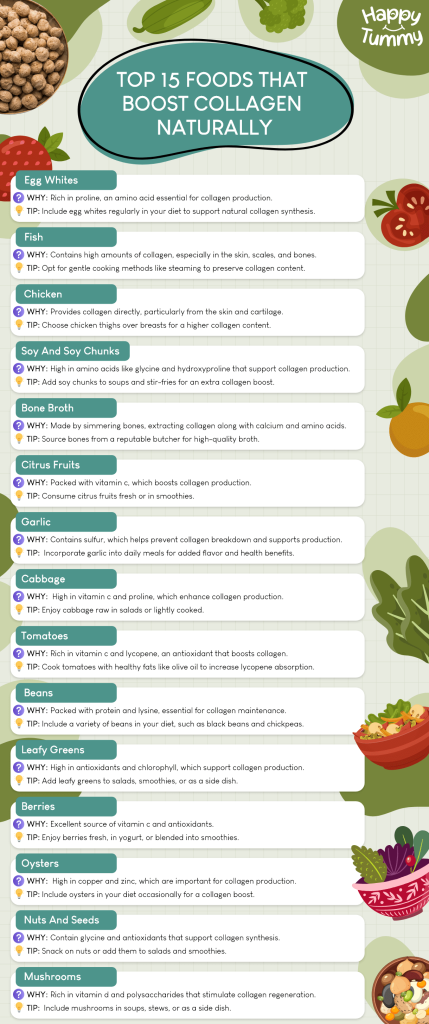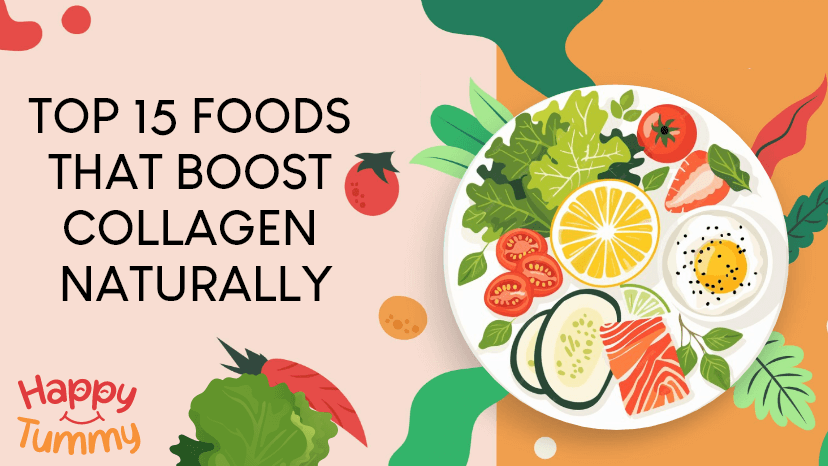Table of Contents
Collagen is making some buzz around these days. And if we talk of the celebrity world, it has become the talk of the Bollywood town. The reason? It’s the ability to enhance skin health by increasing elasticity and reducing fine lines and wrinkles. But collagen is not just about skin. It improves joint health, bone density, muscle health, heart health, wound healing, etc.
Collagen is found in the skin, bones, muscles, tendons, and ligaments, providing strength, elasticity, and support.
Because collagen production starts to decline as we age, it comes down to compensating it by eating collagen-rich foods. Eating foods rich in collagen has been shown to improve not just skin health but each area connected to it. While few foods provide collagen directly, few others enhance our bodies’ ability to produce more collagen.

Here is a list of the top 15 foods that may help increase collagen levels:
1. Egg Whites
“Sunday ho ya Monday, roz khaao Andey”, ever heard of this iconic slogan and followed it? If not, then you may start doing it after knowing this – egg whites can help you get not just protein but also enhance your skin quality. It is because egg whites contain proline.
Proline is an amino acid that our bodies use to produce collagen naturally. So, while egg white doesn’t directly provide collagen, it provides the raw material required for it. [1]
2. Fish
Fish are quite rich in collagen, especially the parts that most people avoid eating. For example, fish’s head, scales, and eyeballs contain the highest amount of collagen compared to fish meat.
Collagen present in fish is considered to be the easiest to digest, absorb, and use. A study found that marine collagen (collagen of water creatures) was easy to absorb and enhanced skin health. It led to supple and more elastic skin and reduced fine lines. [2]
While fish do contain collagen, note that cooking it in an unhealthy manner may actually destroy it. So, avoid high-heat cooking such as deep frying if you want to harness the most collagen out of it.
3. Chicken Cooked with Bones
Chicken, when cooked with bones, is another rich source of getting collagen straight from food. It’s because chickens offer a high amount of protein. Chicken is also comparatively cheaper. This is the reason most companies use chicken bones as the source of their collagen supplement production.
Similar to fish, chicken meat also offers less amount as compared to cartilage and bone. Also, the thigh of chicken offers more collagen as compared to chicken breast. So make your choice wisely when eating chicken for collagen.
A study done on chicken collagen intake found that it helped with joint pain, inflammation, etc. [3]
4. Soy and Soy Chunks
Soya beans and soya chunks, both of these foods contain high amounts of protein. Not just this, soya chunks contain good amounts of amino acids such as glycine, hydroxyproline, etc. These amino acids act as the foundation for collagen production. [4]
So, while soya beans and soya products might not provide you with collagen directly, they will provide the raw material required in good amounts.
5. Bone Broth
Bone broth might sound extremely high in collagen. However, it does contain very high amounts of collagen. Apart from collagen, it also contains rich amounts of calcium, phosphorous, chondroitin, amino acids, etc. [5]
Bone broth is a simple recipe that aims at extracting collagen by simmering bones in water. However, because different recipes might use different quality animal bones, the final collagen content might differ. If you want to ensure the quality of your bone broth in terms of collagen, source your bones from an expert butcher.
6. Citrus Fruits
Why citrus fruits for collagen? Citrus fruits contain a high amount of vitamin C. Now, vitamin C is a well-known antioxidant that boosts collagen production in the body. Studies have found that vitamin C intake boosted collagen production, bone healing after fracture, and enhanced wound healing. It is always a win-win, considering how citrus fruits enhance our overall health. [6]
Here are some citrus fruits you may consider adding to your diet for collagen boost –
- Grapefruit
- Oranges
- Lemons
- Pomelo
- Tangerine
- Lime
And the list goes on. However, when embracing citrus fruit, make sure you don’t have hyperacidity. Citrus fruits can make your acidity worse.
7. Garlic
Garlic and ginger are two foods that go almost always in the Indian wok. They flavour most Indian dishes, not to mention the herbed garlic bread and other garlicky delicacies.
Garlic, although zero in terms of collagen, contains rich amounts of sulfur. Now, sulfur is a trace mineral that helps not only collagen production but even prevents collagen damage.
Now, garlic also boasts a high antioxidant content. Antioxidants are known to enhance skin health due to their free-radicals-fighting property. Free radicals are known to damage cells and cause premature ageing with fine lines and wrinkles. [7]
8. Cabbage
Cabbage is the go-to component of any salad, be it anywhere in the world. It’s light. It’s crunchy. And it’s super healthy as well. Cabbage contains two compounds in good amounts:
- Vitamin C
- Proline
Both these gems are known to boost collagen production. Proline is required for the biosynthesis of collagen and other proline-containing proteins. This is critical to maintaining tissue integrity for instances like wound healing.
Furthermore, cabbage is full of antioxidants and has also shown strong anti-inflammatory properties. Studies have found that cabbage helps deal with cabbage-induced arthritis. [8][9]
Precaution: Individuals with thyroid disorder then, cabbage should be avoided as it contains goitrogens, which cause hormonal imbalance
9. Tomatoes
Tangy tomatoes are a treat to the tongues. But more than this, they are a treat to the skin and joint health. Tomatoes stay soaked in vitamin C. As said above, vitamin C boosts collagen production.
Apart from their vitamin C content, tomatoes also contain a pretty decent amount of lycopene. It is the same carotene that gives tomatoes their red iconic colour. Lycopene is a powerful antioxidant that is known to possess strong anti-ageing properties and boost skin health.
Pro Tip – The right way to harness the best of tomatoes is to cook them with healthy fat (mono-unsaturated and poly-unsaturated fat). You may use olive oil, virgin mustard oil, etc. Cooking tomatoes with fats enhances the availability of lycopene. [10][11]
10. Beans
The beautiful beans somehow make their way into any list of foods rich in anything. Beans, apart from their high anti-oxidant content, also possess collagen-boosting properties. It can help boost collagen production in a few ways.
- First, they are packed with protein, especially the amino acid lysine. This protein is crucial for building strong collagen fibres. It holds collagen together. This is what keeps your skin firm and flexible and joints healthy.
- Additionally, beans contain other helpful nutrients like copper. Copper works along with lysine and helps in collagen formation.
So, eating beans can provide your body with the building blocks it needs to maintain healthy collagen levels. Just make sure you choose healthier cooking methods. [12]
11. Leafy Greens
Where go beans, there go leafy greens. They must be included in your diet anyhow. When it comes to skin health, leafy greens are something to fall for. It is because they contain high amounts of antioxidants, especially chlorophyll (the champ that gives them their green colour).
Chlorophyll, similar to lycopene, can help your body produce more collagen. You may call it procollagen if you want. So, if you want to boost your collagen, opt for leafy greens such as:
- Spinach
- Kale
- Swiss chard
- Collard greens
The best thing about spinach is that it is also a good source of vitamin C, which boosts collagen production. [13]
12. Berries
Berries are the fount of vitamin C. You’ll always find these tiny treats in skin-related commercials. Include berries in your skin-friendly diet. Here are a few examples of berries that stay rich in vitamin C:
- Strawberries
- Raspberries
- Goji berries
- Blackberries
- Blueberries
Goji berries, apart from vitamin C, also contain plenty of lycopene. As we stated above, lycopene boosts collagen.
One study found that taking berry extracts not only enhanced wound healing but also boosted collagen synthesis. [14]
13. Oysters
Oysters are a lesser-known food when it comes to collagen. Here is why these pearly gems must be included in your diet of collagen-rich foods:
- It contains an exceptionally high amount of copper
- Oysters offer good amounts of zinc
Both these minerals are known to boost collagen. [15]
14. Nuts and Seeds
Nuts and seeds are an inseparable part of a healthy diet. And when it comes to skin health, they are a must. Nuts, especially cashews, contain decent amounts of glycine. Glycine, as is found by science, is every 3rd of 4th amino acid found in collagen. [16]
Besides this, nuts and seeds are rich in high calorific value, dietary fibres, unsaturated fatty acids, proteins, antioxidants, vitamins E, B6, folic acid, and niacin. Which are essential for rejuvenating skin health.
They are also rich in minerals such as magnesium, zinc, iron, copper, selenium, phosphorus, and potassium and low in saturated fats and cholesterol.
These nutrients help improve collagen.
Apart from cashews, almost all nuts and seeds contain high amounts of antioxidants. A diet rich in antioxidants is known to be a contributory factor for young skin.
15. Mushrooms
Mushrooms are one of the few foods that can help you get your daily dose of vitamin D. Now, vitamin D, similar to copper, zinc, sulfur, and certain vitamins, helps in collagen production.
Furthermore, mushrooms, particularly their polysaccharide content, can stimulate collagen regeneration. This regeneration is a crucial step in wound healing. Also, mushrooms contain substances like beta-glucans. These substances can stimulate the production of collagen.[17][18]
Studies have found a strong relationship between mushroom intake and quick wound healing. This has been attributed to mushroom’s ability to boost collagen.
The Bottom Line
As we age, our body starts producing less and less collagen. Studies have found that having a diet full of collagen-rich foods can not only enhance skin quality but may even speed up wound healing, reduce joint pain, etc.
While some foods like egg whites, fish, chicken, bone broth, etc., directly provide collagen, other foods such as garlic, leafy green, berries, mushrooms, tomatoes, cabbage, citrus fruits, etc. empower our bodies to produce more collagen. The wisdom lies in not depending on one food but keeping a good mix.
FAQs
Some foods that can boost collagen production are nuts & seeds, mushrooms, berries, fish/seafood, and green leafy vegetables.
To enhance your collagen production, aim for fruits rich in vitamin C, lycopene, proline, etc. Some examples of fruits that boost collagen production include goji berries, tomatoes, oranges, pomelo, etc.
The best way to increase collagen is to consume a healthy balanced diet with all the essential macro and micronutrients such as protein, good fats, healthy carbs, vitamins & minerals. Also, cut on your sugar, refined carbs, sun exposure, and stress, and try to get better sleep.
Some signs that your body is producing less collagen include joint pain, wrinkles, fine lines, sunken eyes, muscle pain, slow wound healing, and dry skin.















